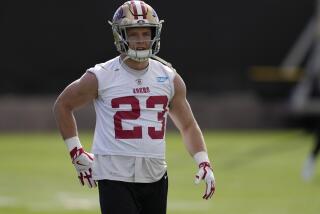NFL PREVIEW 1988 : Marshall’s Jump Isn’t a Great Leap for NFL : Free-Agent Linebacker’s Move to Redskins Not Followed by Mass Exodus of Players
- Share via
HERNDON, Va. — The crudely painted, two-foot-high sign nestled in a stretch of curbside grass simply reads, “Hog Heaven,” with an arrow pointing down the street. It is the first indication that the landscape on the peaceful block in the midst of a Virginia industrial park is about to change drastically.
And sure enough, a couple of hundred yards down the road, a visitor comes upon Redskin Park, training site of the Washington Redskins.
Hog Heaven? The first word is the nickname of the team’s offensive line, but the reference to heaven might better be applied these days to a defensive player. Linebacker Wilber Marshall has yet to play in his first regular-season game for the Redskins, but when he looks back at where he came from--financial hell, in his eyes--he figures he has indeed achieved nirvana.
Marshall joined the Redskins last spring, coming over from the Chicago Bears as a free agent to sign a 5-year, $6-million contract.
That raised more than a few eyebrows around the NFL. Free agent ? There ain’t no such animal in this league, we keep hearing. Kirk Gibson may come to the Dodgers, Moses Malone may go to the Atlanta Hawks. But in football, a star who becomes a true free agent is about as commonplace as a playoff berth for the Clippers.
In fact, the last move from one team to another by a real-life NFL free agent occurred 11 years ago, when Norm Thompson, a somewhat-less-than-legendary cornerback, moved from the then-St. Louis Cardinals to the then-Baltimore Colts.
A major point in the NFL Players Assn. antitrust suit against the league is the inability of free agents to get bona fide offers from other clubs.
So what happened? How was Marshall able to go where almost no man had ever gone before?
Very quietly, he explains. No Eric Dickerson work stoppage routine for him.
“You have to reach out and try to make a deal by yourself,” Marshall said. “That’s what we (he and his agent, Richard Bennett) did. I didn’t make any waves. I wasn’t going to threaten the Bears, tell them, ‘I’m going here, I’m doing this, this team wants me.’
“When you do that, all they have to do is pick up a phone, call the other team and ask, ‘Do you want a trade? We want this and we want that.’ Or they can say, ‘Hey, we’re going to match anything you do.’ But if you go in and do it the right way, be quiet and get everything situated, you give them seven days to make the decision on whether or not to match the offer.
“We did it suddenly, like that. (The Bears) didn’t know what to do. It’s embarrassing for a player to put them on the spot like that. That hurt them, hurt their pride.”
Listening to Marshall talk during a break in practice at Redskin Park, it was obvious that his pride had been hurt by what he perceived as disrespect from the organization for which he had labored four seasons, becoming a two-time Pro Bowl player and an important force in Chicago’s victory in Super Bowl XX.
Holder of a contract that paid him around half a million dollars in the last year, Marshall was thinking in terms of a raise up to around $1 million per season. What he got instead was a cold shoulder, he said.
“I did a lot for that team,” Marshall said. “All I asked was to be rewarded with a decent raise that would compare me with some of the other ‘backers in the league. (The Bears) wanted to play games.”
Before it was over, Marshall said, the Bears even used retired superstar Walter Payton to carry the ball in the talks. Payton called Marshall to find out where he stood.
“That’s just the way they are,” said Marshall of his former employers. “They want to know what kind of leverage you have. I wouldn’t say anything to (Payton) or anyone else because I’m not going to give up my leverage.”
The Bears, though, had other problems to worry about at the end of last season, when Marshall approached them. General Manager Jerry Vainisi was leaving and was replaced on the negotiating front by Ted Phillips, director of finance. That, said Phillips, was the reason for the delay on Marshall.
“It was not the time to make an offer,” Phillips said. “Nobody was prepared to negotiate a contract that size at that time. Besides, most of the time, we have done our veteran contracts in the spring, after mini-camp. Looking back, and hindsight is always 20/20, maybe we made a mistake in Marshall’s case. But given the demands he made, it wouldn’t have made much difference, anyway.”
So Bennett went shopping.
Coincidentally, when Thompson switched teams, the agent was--you guessed it--Richard Bennett. Thompson got $64,900, and the Cardinals got a third-round draft choice.
“After 11 years, I figured I was past due,” Bennett said.
This time, he got his client a base salary of $900,000 this year, increases of $100,000 each year until 1992, a $500,000 signing bonus and a no-trade clause for the first year.
“We were not in a position to match the offer,” Phillips said. “But I don’t believe we didn’t take care of Wilber Marshall while he played here. He received a huge contract. We paid him very big dollars.
“The Bears don’t begrudge him what he got. He went through the system and got his money. He was in the right place at the right time.”
Although Marshall has jumped the NFL’s free-agent chasm, he does not see himself as a pioneer. “It’s very tough to move unless you have someone out there daring enough to reach out and do it,” he said.
It was not a move taken lightly in Washington. For one thing, the Redskins could hardly be described as a team in desperate need, since they won the Super Bowl last January. For another, they had to pay compensation to the Bears: their No. 1 draft picks in 1988 and ’89. But in Marshall, Redskin management saw a 26-year-old force in the middle with the strength to stop the run, the speed to stop the pass and the versatility to do both.
“We obviously had an interest in getting a linebacker somehow, and it didn’t look like we could get him through the draft,” said Bobby Beathard, Washington’s general manager and the man who proposed the Marshall plan to owner Jack Kent Cooke.
“Then Richard Bennett, who lives in Washington, called with the idea of our making an offer for Wilber. After several discussions, we decided to take a shot at it, not expecting it to happen. But it did.”
It was the no-trade clause in the offer sheet that made things particularly sticky for the Bears. Either they paid Marshall the $6 million, an amount way out of whack with their payroll, or they lost him. Plain and simple. No other options. The no-trade clause prevented them from keeping Marshall until they could work out a deal with someone else.
The big concern after Marshall dropped the first shoe was whether the other would follow. Followed by a whole closet full. Was he just the first in a long line of players to go the free-agent route?
“If any gates were opened, nobody went through them, did they?” Cooke said. “I wasn’t the least bit surprised we got him, because I operate on the principle that anything and everything is possible.”
But was he breaking faith with his fellow owners? Did they call to remind him of that?
“I did not hear from a one,” he said. “But that indicates nothing. Whether they were angry or whether they were passive I don’t know.”
The general feeling around the league seems to be that the owners were not too concerned because this was viewed as an aberration, a rare blend of circumstances. It took:
--A Super Bowl winner willing to spend $6 million to improve its position even further .
--A team that could afford to give up two No. 1 draft choices because at least one and perhaps both would be low enough to be little better than second-round picks.
--A club willing to lose a big star rather than pay him . It has taken more than a decade to find such a combination, and there seems little concern that others may be on the horizon unless a new labor contract lowers the compensation requirements.
“The Redskins had a particularly good position to take advantage of the Marshall situation because of their draft choices,” said Wellington Mara, owner of the New York Giants. “So be it. We made the rules and we’ll live with them.
“Jack Kent Cooke is living within the rules, and you can’t really argue with that. But those rules contain a built-in limitation because once you give up your top draft choices, you’re out of the market for a while.”
Nor would Mara rule out a Giant entry into that market.
“It’s always a possibility,” he said. “Always an option. So far there hasn’t been a player available that is worth what we’d have to give up.”
A cynic might say that it was convenient for the league, which is trying to settle on a new collective bargaining agreement with the players’ union, to have a free agent jump teams just now, to show it can be done.
Said Bennett: “For the deal to happen, it took a general manager absolutely certain of his ability to judge talent and an owner confident of that general manager’s ability and willing to spend the money and sacrifice cash flow. There are other owners out there like that, but I think Jack Kent Cooke is the best and the brightest of them. He doesn’t feel he has to answer to anybody.”
Few doubt that Marshall was worth the price, but he hasn’t been so far. A notoriously slow starter, he has struggled with the voluminous defensive playbook of the Redskins.
“It’s a new system and he’s not completely comfortable with it,” Beathard conceded. “He’s coming along, but it’s going to be a little while before he’s as noticeable on the field here as he was up at Chicago. But he could make a big difference for us. He’s reckless, fast and he gets all over the field. He’s a good football player with the awareness to get to the ball. He can be a dominant player for us.”
A powerful force on defense? Probably. A powerful force in the free-agent movement? Probably not. But who can say? Certainly Cooke didn’t when the question was put to him about the ultimate effect of the Marshall move.
“The name is Cooke, not Cassandra,” he said, referring to a prophet in Greek mythology. “I haven’t the foggiest notion what’s going to happen five minutes from now, let alone with other linebackers or other players in the league.”
NFL Notes
Miami’s Don Shula is the only NFL coach with two sons who are NFL assistants, David at Miami and Mike at Tampa Bay. . . . San Diego’s Al Saunders, who was born in London, is the league’s third foreign-born coach. Hugo Bezdek, who led the Rams in 1937-38, was born in Czechoslovakia, and Jock Sutherland, who coached the Pittsburgh Steelers in 1946- 47, in Scotland. . . . A teacher in Paris, Tex., is the only high school coach who has produced two active NFL coaches. He is Raymond Berry, who once coached Gene Stallings of the Phoenix Cardinals and his son, also Raymond Berry, of the New England Patriots.
With seven more touchdowns, halfback Marcus Allen will tie Hall of Fame receiver Fred Biletnikoff as the Raiders’ all-time touchdown leader. Allen scored 70 in his first 6 NFL seasons. . . . With 464 more yards, Raider receiver James Lofton will become the second in NFL history to gain 11,000 yards on pass plays. The leader, with 12,041, is Seattle’s Steve Largent. The only others over 11,000 began their pro careers in the old American Football League: Charlie Joiner, 12,146, and Don Maynard, 11,834. Lofton also needs 29 catches to reach 600, a number achieved by only five others in the last 69 years. Cleveland’s Ozzie Newsome is 25 short of 600, and Wes Chandler, now with San Francisco, needs 45.
The next milestone for San Francisco’s Jerry Rice will come harder. Rice, who scored every time he played last year, set the NFL record at 13 for touchdown catches in consecutive games. The record for touchdowns scored by any means in consecutive games, 18, belongs to Lenny Moore of the old Baltimore Colts. . . . After five straight 1,000-yard seasons, Eric Dickerson of the new Colts can join NFL record-holders Franco Harris and Walter Payton with another 1,000-yard season in 1988.
Although Denver was in the Super Bowl both times, Cleveland’s two-year regular-season record, 22-9, was the AFC’s best in 1986-87. . . . If Bernie Kosar leads Cleveland into the playoffs again, he will have done it every time in his first four seasons. Kosar and Miami’s Dan Marino are the only quarterbacks who have begun NFL careers with playoff appearances in their first three years.
New England is 0-10 in overtime since the NFL started breaking ties in 1974. . . . Redskin Coach Joe Gibbs’ 85-33 record is the NFL’s best since he began his pro career at Washington in 1981. . . . The average age of the NFL’s 28 head coaches is 51 years old.
The NFL’s last five rushing champions have worn Los Angeles-area uniforms: Eric Dickerson in 1983-84, Marcus Allen in 1985, Dickerson in 1986, and Charles White in 1987. . . . The wild-card playoff games will be played Christmas weekend, Saturday, Dec. 24, and Monday, Dec. 26. The divisional playoff games are scheduled for Saturday, Dec. 31, and Sunday, Jan. 1, to be followed by the college bowl games on Monday, Jan. 2. . . . The Houston Oilers and Astros are playing on their own separate floors this year at the Astrodome. Before Oiler games, an air-jet system operated by a six-man crew floats the Astros’ baseball surface away and installs the Oilers’ field. The change can be made in three hours.
Times staff writer Bob Oates contributed to this story.
More to Read
Go beyond the scoreboard
Get the latest on L.A.'s teams in the daily Sports Report newsletter.
You may occasionally receive promotional content from the Los Angeles Times.










